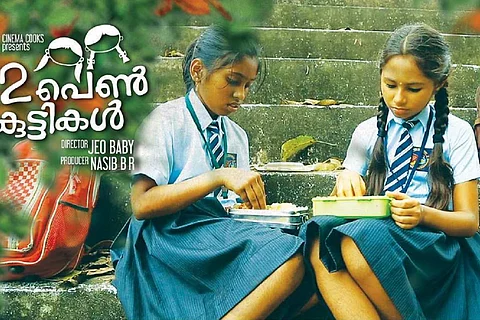

When Achu shakes her legs, sings songs loudly, whistles in the house, she hears the same four words from her mother – pennkuttykal athu cheyaan paadilla – Girls shouldn’t do this. Achu, poor thing, 10 or 11 years old, stops shaking her legs, singing and whistling; and murmurs without comprehending, “Can’t do that either!” The long minutes of the title credits of 2 Pennkuttikal – Two Girls – a film made by Jeo Baby in 2016, chronicle these movements of Achu’s life, hindered and paused without explanation. Jeo Baby, the man who grew famous within hours of The Great Indian Kitchen, his newest film, releasing online, appears to be a master of telling stories of male privilege through the eyes of women. In this case, two young girls.
The movie begins from when the girls are grown up and living their separate individual lives. Tovino Thomas plays a small role as the fiancé of one of them. However, Achu (Anna Fathima) – short for Aswathy – and Anagha (Shyambhavi), as schoolgirls, tell a much more convincing story than their adult versions, taking you through the many disadvantages girls go through, growing up, that no one really takes notice of.
Both Achu and Anagha want to visit the mall and the beach in their town but neither of their parents have the time or interest. Anagha lives with her single mother, a lawyer always busy with the work, and on certain days of the week, visits her dad. Achu comes from an economically poorer household with a drunk dad and a practical homemaker mother.
Achu keeps harping on the thought that if she were a boy she could have gone by herself. She is not clear why this is so. What is peedanam (assault), she asks her mother when she reads the morning paper. She gets no reply. But it’s stuck on her mind that girls just can’t go alone. Once she reads about a trans person going through a sex-change surgery and asks her mother if she could be a boy too so she could go out alone.
Anagha has better comforts – you see the giant teddy bears and smartphones – but her interrupted conversations with the mother give her no joy.
You have to appreciate Jeo Baby for taking note of the things that can hurt 10 or 11 year old girls, and the topics that are of interest to them. The classroom sequences are well made, the exchanges between students and teachers, the impositions and memorisation of daily lessons all photocopied from life. Even the conversations between the two girls are very raw; you don’t doubt for a moment that they are anything but regular sixth graders who just want to get through the boring lectures and have some fun. Jeo Baby has shown his mettle for handling child characters with his later film Kunju Daivam, too. In 2 Pennkuttikkal, he draws a clear picture of the discrimination faced by young girls, by simply presenting the routine days of the two children.
In one scene, Achu reads out a school report on the differences between boys and girls. Achu’s first finding is of course that boys can go out alone at any time, the one point that’s always upset her. She comes up with more after research. Women need to take their husband’s name after marriage while men don’t, there is ‘sthree dhanam’ (dowry) but there is no ‘purusha dhanam’ , there is pennu kaanal (ritual of 'seeing' the woman by the prospective groom and family in an arranged marriage system) and no cherukkan (man) kaanal, men go to thattukada and women don’t, men can pee on the roads and women can’t.
The two girls have their first taste of independence when they decide to go out on their own, urged by a movie scene in a Padmarajan film. The two actors are so good that you feel their excitement at the bus ride, the joy of walking through automatic doors in a mall, and seeing the sea for the first time.
Watch: Song from 2 Pennkuttikal
But you have the gnawing fear that any minute now something can go wrong. The girls are still unaware of the dangers around them, innocence still unbroken in their little world. Even when a man offers to help one of them to go deeper into the sea, they laugh unsuspectingly till he acts weird and Achu pushes him down to the waves and runs off with Anagha. There, Jeo Baby is building character. Achu’s urge to be the protector starts when she is young. She grows up to be a woman (Amala Paul) who saves many others, running a place to shelter victims of assault. Anagha (Anju Kurian) becomes a documentary maker.
The film, however, loses its magic when the children grow into adulthood, and tends to take on a preachy mode which was absent in their earlier lives. Like the children, the film too is innocent in its making in their portions, raw and real while not letting any viewer dodge the truth of a girl’s life. Even though the mother characters are less prominent – mostly serving to show the differences in their circumstances – the apathy shown by the society towards the poor comes out clearly in the few scenes that they are together. Achu takes the bulk of the punishment when the two children are caught on their day out and her mother simply nods at the news. Anagha’s mother is willing to accept this injustice despite being a lawyer and like the school principal, looks down on her friendship with Achu, because the latter comes from a poorer background. It’s all in their reactions to events.
The film, available on YouTube, appears to be a precursor to The Great Indian Kitchen. A director who can see through the eyes of young girls the world that’s presented to them, could definitely take the place of the newly married woman bound to a kitchen.